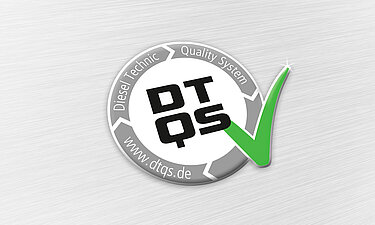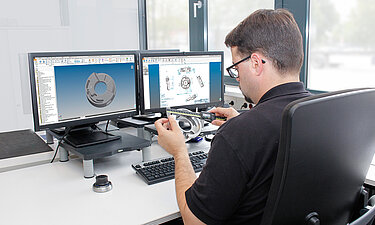| AQL | AQL stands for "Acceptance Quality Limit". At Diesel Technic, the incoming goods inspection is carried out with inspection plans in sample testing. The inspection lot size used here is taken as per the worst acceptable quality level of a process, the acceptable quality level AQL. This is calculated from tables of DIN ISO 2859, which in turn is to be considered as standard in the supply chain of the automobile industry. The value specifies how high the probability is of detecting errors in a delivery. |
| CAQ | CAQ software is used in Quality Assurance to carry out the receiving inspection and the documentation of the test results. CAQ stands for “Computer Aided Quality”. This software is used to create inspection plans for all products of the brands DT Spare Parts and SIEGEL Automotive. These inspection plans are used to generate goods receipt inspections. The plans contain all test-relevant requirements. Examiners are shown them along with technical documentation, such as drawings or circuit diagrams, etc. The test results are documented by the examiner in the software and stored in an audit compliant manner. This guarantees the Quality Assurance traceability over the long term. This CAQ software is also used in product development and aftersales service. |
| Batch tracing | Tracing batches using lot numbers means full traceability of DT Spare Parts and SIEGEL Automotive branded products in the market. Distribution partners provide their workshop customers with lot numbers which ensures efficient handling, e.g. in warranty cases. The lot number can be found on the supplier documents, article label or on the article itself. Diesel Technic SE thus guarantees permanent article traceability. The lot number is an important foundation on which the company’s own branded guarantee is built. Well-functioning batch traceability builds trust in quality and safety. |
| DTQS process auditors | A component of the Diesel Technic Quality Systems (DTQS) is the regular performance of process audits at the suppliers within the product life cycle for articles of the brands DT Spare Parts and SIEGEL Automotive. Trained and certified DTQS process auditors visit the external production sites to check the effectiveness and improvement potential of the existing production processes. With the help of the DTQS questionnaire, based on quality standard VDA 6.3, the individual process steps are questioned and checked, and all results are documented. In a final action plan, tasks for the adaptation and improvement of the production processes are described and implemented and checked together with the suppliers within a defined period of time. |
| Guarantee | Users can benefit globally from products from the DT Spare Parts brand with their 24-month guarantee, and from SIEGEL Automotive with their 12-month guarantee from the date of purchase. A guarantee is always a voluntary and largely customisable service. It offers additional benefits over and above those ensured by legal warranty claims. A guarantee means that the guarantor pledges unconditional compensation for a defined period in case of any defects. Should a functional defect arise in a product, Diesel Technic would be bound within the scope of the guarantee to provide a replacement. By careful analysis of the defect and, if needed, swift improvement measures introduced, every case of warranty can even be an opportunity for product improvement. This benefits both the distribution partners and their customers as well as Diesel Technic. |
| VDA 6.3 | VDA is the acronym for the Verband der Automobilindustrie e.V., the German automobile industry association. This association publishes guidelines and directives for the implementation of standards and OE/OEM requirements. In a VDA 6.3 band procedural audit, the manufacturing, series production and service processes of the automotive industry are evaluated. The automobile industry association developed the standards together with a number of German automobile manufacturers and suppliers. The procedural audit according to VDA 6.3 is an essential instrument for process monitoring. VDA 6.3 has established itself as a global standard for procedural audits, as it makes results comparable. The audit itself supports the nomination and qualification of suppliers and the evaluation and qualification of individual series production processes and services. A successful procedural audit according to VDA 6.3 provides evidence of compliance with ISO TS requirements. Within the framework of ‘continuous improvements’, these methods additionally support the safeguarding of high quality standards and the avoidance of negative cost developments. For these reasons and to ensure high levels of customer satisfaction, Diesel Technic SE has established its own team of VDA 6.3 auditors. For distribution partners of Diesel Technic and their workshop customers, this ensures that branded products of guaranteed quality are available worldwide. And should a problem nevertheless arise, a sustainable adjustment to the process means that it is sure to be kept a one-off. |
| 8D report | The 8D report is a document, which is exchanged between the supplier and Diesel Technic within the framework of the DTQS – Diesel Technic Quality System - if there is a deviation from item-specific specifications (e.g. incoming goods stoppage). 8D stands for the eight disciplines (process steps), which are required for the problem solving process by the supplier for the processing of quality problems in order to remedy the determined errors in the short and long term. An 8D report is thereby part of the continuous improvement process CIP with the supplier. It is created by Quality Assurance, filled out by the supplier, checked by engineering/development for plausibility and the implementation of measures is monitored by Quality Assurance. |
browser hint
Your browser version is outdated. Please update your browser. We recommend Google Chrome for optimal use of the website.
Download

